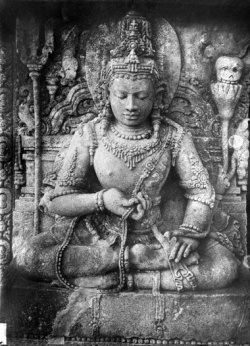Difference between revisions of "Vātamiga Jātaka"
| Line 1: | Line 1: | ||
[[File:Lokapāla 02.jpg|thumb|250px|]] | [[File:Lokapāla 02.jpg|thumb|250px|]] | ||
| + | |||
| + | |||
| + | |||
| + | |||
| + | |||
| + | |||
| + | |||
[[Vātamiga Jātaka]] (No. 14) | [[Vātamiga Jātaka]] (No. 14) | ||
| − | The [[Bodhisatta]] was once born as [[Brahmadatta]], [[king]] of [[Benares]]. He had a gardener named [[Sañjaya]]. A vātamiga used to visit the {{Wiki|royal}} park, and the [[king]] asked [[Sañjaya]] to catch it. [[Sañjaya]] put [[honey]] on the grass where the [[animal]] fed, and, in due course, the [[animal]] came to eat out of his hand. He was thus able to entice it right into the palace, where he shut the door on it. The [[king]] marvelled that a vātamiga, who was so shy that if it once saw a man it would not visit the same place for a [[week]] after, should allow itself to be caught by [[greed]]. | + | |
| + | |||
| + | |||
| + | |||
| + | |||
| + | The [[Bodhisatta]] was once born as [[Brahmadatta]], [[king]] of [[Benares]]. He had a gardener named [[Sañjaya]]. A vātamiga used to visit the {{Wiki|royal}} park, and the [[king]] asked [[Sañjaya]] to catch it. [[Sañjaya]] put [[honey]] on | ||
| + | |||
| + | the grass where the [[animal]] fed, and, in due course, the [[animal]] came to eat out of his hand. He was thus able to | ||
| + | |||
| + | entice it right into the palace, where he shut the door on it. The [[king]] marvelled that a vātamiga, who was so shy that if it once saw a man it would not visit the same place for a [[week]] after, should allow itself to be caught by [[greed]]. | ||
The story was related in reference to [[Cullapindapātika Tissa]] (q.v.), who was enticed back to the lay [[life]] by a slave girl. [[Sañjaya]] is identified with the slave and the vātamiga with the [[monk]]. J. i.156ff. | The story was related in reference to [[Cullapindapātika Tissa]] (q.v.), who was enticed back to the lay [[life]] by a slave girl. [[Sañjaya]] is identified with the slave and the vātamiga with the [[monk]]. J. i.156ff. | ||
According to the [[Dhammapada]] Commentary (DhA.iv.199), however, it was with reference to [[Sundarasamudda]] that the story was told. | According to the [[Dhammapada]] Commentary (DhA.iv.199), however, it was with reference to [[Sundarasamudda]] that the story was told. | ||
| + | |||
| + | |||
| + | |||
| + | |||
{{R}} | {{R}} | ||
[http://what-buddha-said.net/library/DPPN/va/vaatamiga_jat_014.htm what-buddha-said.net] | [http://what-buddha-said.net/library/DPPN/va/vaatamiga_jat_014.htm what-buddha-said.net] | ||
[[Category:Buddhist Terms]] | [[Category:Buddhist Terms]] | ||
[[Category:Jātakas]] | [[Category:Jātakas]] | ||
Revision as of 20:16, 1 November 2024
Vātamiga Jātaka (No. 14)
The Bodhisatta was once born as Brahmadatta, king of Benares. He had a gardener named Sañjaya. A vātamiga used to visit the royal park, and the king asked Sañjaya to catch it. Sañjaya put honey on
the grass where the animal fed, and, in due course, the animal came to eat out of his hand. He was thus able to
entice it right into the palace, where he shut the door on it. The king marvelled that a vātamiga, who was so shy that if it once saw a man it would not visit the same place for a week after, should allow itself to be caught by greed.
The story was related in reference to Cullapindapātika Tissa (q.v.), who was enticed back to the lay life by a slave girl. Sañjaya is identified with the slave and the vātamiga with the monk. J. i.156ff.
According to the Dhammapada Commentary (DhA.iv.199), however, it was with reference to Sundarasamudda that the story was told.
